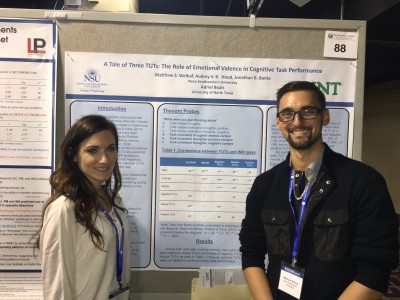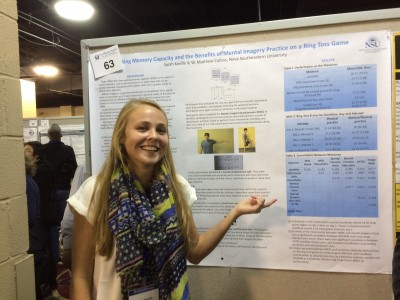NSU Newsroom
SharkBytes
Horizons
This version of NSU News has been archived as of February 28, 2019. To search through archived articles, visit nova.edu/search. To access the new version of NSU News, visit news.nova.edu.
This version of SharkBytes has been archived as of February 28, 2019. To search through archived articles, visit nova.edu/search. To access the new version of SharkBytes, visit sharkbytes.nova.edu.
College of Psychology Students Present Research at Psychonomic Society’s Annual Meeting

Matthew Welhaf and Audrey Hood, students in the College of Psychology’s M.S. in Experimental Psychology program, presented research at the Psychonomic Society’s annual meeting.
Three students from NSU’s College of Psychology presented their work at the Psychonomic Society 56th Annual Meeting held November 19–22, 2015, in Chicago, Illinois.
Matthew Welhaf and Audrey Hood, students in the college’s M.S. in Experimental Psychology program, presented work on mind wandering and working memory performance. Their poster, titled “A Tale of Three TUTs: The Role of Emotional Valence in Cognitive Task Performance,” examined the content of mind wandering as a possible moderator for altering the impact on ongoing task performance.
The students worked with Jonathan Banks, Ph.D., assistant professor at the college, and Adriel Boals, Ph.D., associate professor at the University of North Texas, to reanalyze data from two prior studies that included measures of the emotional valence of mind wandering, or task-unrelated thoughts (TUTs).
In both prior studies, negatively valenced and neutral TUTs were correlated with task performance. Positively valenced TUTs were found to be unrelated to task performance. There were no observed differences in the rates of positive and negative TUTs. The results suggest that examination of the content of mind wandering is critical in order to understand the consequence of mind wandering.
“The work that Matt and Audrey have been conducting with myself and Dr. Boals is critical to our understanding of the impact of mind wandering on task performance,” Banks said. “Current theories of mind wandering, or off-task thoughts, propose that all off-task thoughts result in impairments to current task performance.

Sarah Keville, a biology major with a minor in psychology, also presented her work at the Psychonomic Society’s annual meeting in Chicago, Illinois.
“Our work is suggesting that it may be important to pay attention to the content of mind wandering to determine the consequences of the mind wandering to ongoing task performance. The results of the work that was presented and our ongoing research will help improve our understanding of cognitive control, the consequences of failures of cognitive control, and may point to factors responsible for stress-related cognitive impairments.”
NSU undergraduate Sarah Keville also presented her work at the Psychonomic Society’s meeting with a poster titled “Working Memory Capacity and the Benefits of Mental Imagery Practice on a Ring Toss Game.”
Keville, who is majoring in biology and minoring in psychology, examined how individual differences in working memory capacity—or the ability to control attention—affected the benefit people derive from the mental rehearsal of a physical activity.
Conducted with W. Matthew Collins, Ph.D., associate professor at the college, Keville’s experiment had participants either physically practice or physically and mentally practice (using mental imagery) a ring toss game. The working memory capacity of participants was measured, and participants completed a variety of tasks designed to measure their ability to use mental imagery.
Keville’s preliminary results indicated that a combination of mental and physical practice improved performance more than physical practice alone, but individual differences in working memory capacity did not affect whether people benefited from mental practice.
“Sarah’s work is the first to examine how and why mental practice can be effective at improving physical skills and could have implications for how mental practice is used by athletes,” Collins said.